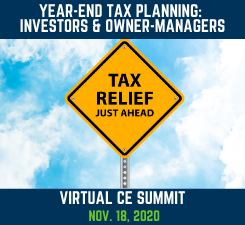Working with Business Owners? Corporate Tax Concepts Misunderstood

Evelyn Jacks
Is a taxable dividend a better option than paying a salary or bonus? There are close to 2 million small businesses in Canada, and many of them are looking for financial professionals to provide simple answers to complex questions such as this, so they can minimize risks to their business. It’s a big opportunity for practice growth, but to work well with these clients, it’s critical to understand owner-manager remuneration options at year end. Now you can step up to better guide these clients, by learning from experienced experts on November 18.
“We are pleased to provide a Virtual CE Summit focused on the year end issues tax, bookkeeping and financial advisors need to know to advise both proprietors (the unincorporated self-employed) and corporate owner-managers,” says Evelyn Jacks, President of Knowledge Bureau, of the November 18 CE Summit agenda. “And, we have assembled three brilliant and experienced instructors to help bring advisors up to speed.”
Larry Frostiak, FCPA, FCA, CFP, TEP notes that advisors are frequently asked to provide guidance on basic tax planning around the payment of salaries vs. dividends and on other taxable  benefits and perks available to employees of privately-owned corporations, such as the use of a corporately owned or leased vehicle. His session will address these matters.
benefits and perks available to employees of privately-owned corporations, such as the use of a corporately owned or leased vehicle. His session will address these matters.
He mentions that shareholder remuneration is especially timely as clients approach the calendar year end. “You and your clients will need to assess the family’s cash needs, their shareholder draws and make decisions around year-end bonuses and/or dividends.” Larry will summarize the key points you will need to consider when assisting or advising your clients on such strategies, including the 179 day limit on accrued bonuses and Tax On Split Income (TOSI) issues on dividends paid to non-active family members.
After completing the online module that accompanies Larry’s presentation, advisors will also gain a better understanding of..
- How corporate/personal taxes “integrate” when income is earned in a corporation and paid through as a dividend to its shareholders
- The benefits and tax issues pertaining to a year-end accrued bonus
- The tax benefits of using the corporation to acquire or lease a vehicle for use by the owner/manager
The expected outcomes or “take-aways” you should achieve include:
- An increased knowledge base and comfort level in the remuneration strategies available to your clients;
- An understanding of the tax concept of corporate integration
- An awareness of the tax compliance and filing requirements; and
- An approach for non-cash remuneration benefits, such as use of a corporately owned or leased vehicle
Also joining this illustrious faculty is Dr. Dean Smith, PHD, CFP, TEP, CPA, CA, RWM™, who will help advisors explain the corporate balance sheet, Section 85 rollovers, the shareholder loan account, the difference between Active Business Income and Specified Business Income, the RDTOH and how to maximize the Small Business Deduction, amongst other important issues small business owners need clarity on.
Evelyn Jacks, DFA-Tax Services Specialist, RWM™, MFA, MFA-P, will start the day with a thorough review of 2020 personal tax changes to help initiate year end tax planning strategies for individuals.
Jenifer Bartman, CPA, CA, CMC, MFA-Executive Business Growth Specialist, RWM™, agrees that the business owners she works with are often frustrated with the lack of guidance they receive from their financial professionals.
“In my experience,” she notes, “business service providers either do not take the time to provide advice to their clients or they lack the skillset and experience to do so. There is a difference between providing services to companies and adding value through seasoned advice. Business leaders need proactive advice that demonstrates an understanding of their company, industry, the challenges and opportunities that they face, as well as risk management strategies. In an increasingly complex and competitive world, good advice is integral to business growth and sustainability.”
Jenifer is an experienced executive coach who has written numerous certificate courses with Knowledge Bureau. Her topic at the November 18 CE Summit, which features a comprehensive online course as part of the pre-work, will be on critical year end planning for the business: Business Results, Analysis And Forecasting. Three important components of year end business management are discussed:
- How to help owner/managers analyze their results
- Budgeting for 2021 business outcomes
- Managing cash flows
Learn how to help your clients understand the current year’s results, an important precursor to budgeting for the year ahead. Integral to this process is ensuring that sufficient attention is paid to cash flow budgeting, to establish important management targets, identify when additional resources might be needed, and what steps should be taken, in terms of financing/capital requirements and surplus cash strategies, such as investing in the company or undertaking owner distributions.
Everything is included in the tax-deductible tuition fees – the comprehensive online course, the Virtual instructional event on November 18 and the CE Accreditation (10 hours) for graduates. There are group rates available for study groups, and best of all – no travel or parking costs!
October 15 is the early bird registration date (save $100). Enrol online!
